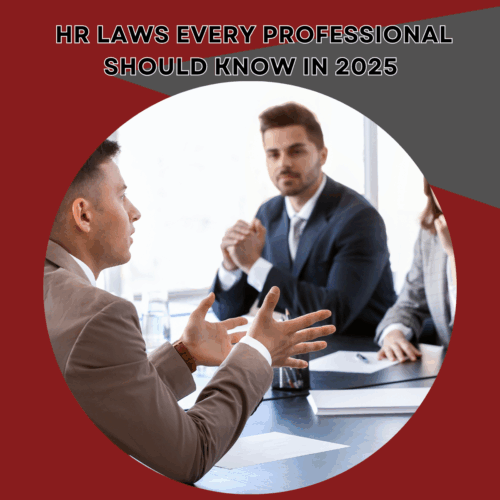Stay ahead of evolving employment law with this comprehensive guide to human resources laws and regulations for 2025, fully updated with the latest HR compliance information.
There are numerous federal, state, and local laws that employers are obligated to comply with in order to protect their business and employees. In many cases, a business’s human resources (HR) team is the entity responsible for ensuring that those laws are complied with. From guaranteeing health care to preventing discriminatory practices, HR departments can have a lot on their plate. For businesses that are too small to have an in-house HR department, it is the responsibility of the business owner to ensure legal compliance of employment laws and statutes.
Need help navigating the complexities of HR law? Contact the knowledgeable human resources attorneys of MBM Law. Our experienced HR lawyers can help your business stay compliant with workplace laws.
Contact HR Employment Law Attorneys of MBM Law
Download an HR Compliance Checklist for 2025
Download our practical HR Compliance Checklist to make compliance easy in 2025!
Just provide your name and e-mail address using the form for instant access to your download. MBM Law will only use your information to send you the checklist and follow up with helpful HR compliance resources if you want them. We will never sell or share your details with anyone else.
Get your free, attorney-developed checklist and make sure your business stays protected and up to date!
What Are the Most Important HR Laws?
There are a number of laws HR professionals should be aware of that relate to employee benefits, workplace safety, workplace discrimination, wages, and work hours – which are all equally important.
FMLA& FLSA
- The Family and Medical Leave Act (FMLA) and the Fair Labor Standards Act (FLSA)
- Together, these two laws limit the workweek to 40 hours and provide employees with 12 weeks of unpaid leave. These laws also provide regulations regarding overtime pay and establish child labor laws.
ADEA
- The Age Discrimination in Employment Act
- As the name suggests, this law prohibits employers from firing, demoting, or otherwise limiting employment opportunities for an individual based solely upon their age.
OSHA
- The Occupational Safety and Health Act (OSHA)
- This comprehensive law ensures that workplace environments are safe for employees and establish rights to compensation if an employee is injured on the job.
Health Coverage
- There are several laws that require employers to purchase health coverage and ensure other benefits for their employees, including the Affordable Care Act, the Employee Retirement Income Security Act, and the Health Insurance Portability and Accountability Act. Together, these laws ensure employees have access to healthcare, insurance opportunities and retirement programs.
Equal Employment Opportunity Laws
- These laws prohibit employer discrimination based on an individual’s race, religion, sex, gender, or nationality when making decisions about hiring, firing, or implementing other employment-related policies or decisions.
Key HR Laws for 2025
In 2025, these new laws and regulations require careful attention.
Pay Transparency
Pay transparency laws are expanding with new requirements demanding disclosure pay scales, benefits, and compensation ranges in all job postings. Many states have implemented this rule for 2025 while many more are currently considering similar legislation. A knowledgeable HR attorney can ensure you are complying with your state’s requirements.
Expanded Non-Discrimination
Laws now prohibit discrimination based on family responsibilities, reproductive health decisions, and immigration status.
Paid Leave Mandates
More states are requiring expanded paid sick leave, parental leave, and “safe time” leave for domestic violence, crime victims, and medical emergencies.
Workplace Safety and Whistleblower Protections
New rules expand whistleblower protections and require visible posting of employee rights under whistleblower laws.
Artificial Intelligence and Technology Law
Restrictions on employer use of AI and digital likeness technology in employment contracts are emerging.
Non-Compete Laws (Pennsylvania House Bill 1633)
On July 17, 2024, Governor Josh Shapiro signed into law HB 1633, also known as the “Fair Contracting for Health CAre Practitioners Act,” (went into effect January 1, 2025) which prohibits the enforcement of “noncompete covenant[s]” with time periods of more than one year entered into by healthcare practitioners and employers as well as impose certain notification requirements on healthcare employers.
How Do HR Professionals Ensure Legal Compliance?
Failure to maintain compliance with any of the HR laws and regulations listed above can result in penalties against the employer, or can even result in the employee bringing a lawsuit against the employer for damages. Compliance with various HR employment laws can take on a variety of forms, such as providing proof of insurance, submitting reports or taking timely action upon identifying a law that is not being complied with. As a result, it is essential for every HR professional to not only know what conduct is required in order to ensure that a law is complied with, but also to know how to demonstrate compliance and keep appropriate records to protect a business. Staying on top of compliance laws and their requirements can help prevent problems well before they arise and ultimately ensure every employee’s safety and security within the company.
An employee handbook is a useful tool to serve as a foundation of your company’s HR policies and procedures. It outlines what you, as the employer, provide in the way of compensation and benefits, but also, what your expectations are of your employees for a positive work culture. It assists in responding to any potentially damaging situation regarding employee rights or discrimination. The handbook provides your employees with answers and is a resource for management to conduct business with consistency and uniformity. But the handbook must be properly worded not only to maintain compliance with the various laws, but also to make it clear that the handbook is not, and was not intended to constitute, a binding written employment contract.
MBM Law’s experienced HR legal team can help you develop a comprehensive compliance program, review your employee handbook, and answer any questions you have about navigating HR regulations.
What Is a HR Legal Compliance Program?
Legal compliance defines the process by which a business – and the employees working for that business – ensure that state and federal regulations are followed. Most HR departments accomplish this by developing a legal compliance program that allows them to check business policies and procedures and confirm they comply with government mandates. For example, a legal compliance program might require that employees be trained to recognize and report any discriminatory activity that does not align with Equal Employment Opportunity Laws, and then create a process by which reported discriminatory behavior is addressed within the company. Such a process helps employers stay aware of behaviors that violate workplace mandates and ensure legal compliance.
HR Compliance Best Practices for 2025
- Update employee handbooks to reflect new discrimination, leave, and pay transparency laws for 2025.
- Post updated workplace notices for whistleblower, safety, and wage statement rights in visible areas.
- Train HR and managers on new leave, discrimination, and technology regulations.
Partner with MBM Law’s HR compliance attorneys for audits and handbook reviews tailored to 2025 regulations.
Get Legal HR Compliance Guidance
What Areas of Employment Do HR Laws and Policies Cover?
Human resource laws and policies cover a wide spectrum of areas, including:
- Work hours and schedules
- Paid and unpaid time off
- Discrimination based on race, religion, nationality, gender or sex
- Medical leave or disability
- Discrimination based on disability
- Workplace injuries
- Insurance and access to health care
- Discrimination based on wage
- Workplace safety
- Employee training and prevention
- Ensuring compliance and reporting
- Investigating claims and facilitating responses
Other HR Legal Responsibilities:
Pennsylvania employment compliance extends throughout the physical workplace, including placing the required federal and state specific posters in visible areas in your facility. They include:
- Equal Employment Opportunity
- Workers’ Compensation Law
- Unemployment Compensation
- Minimum Wage Payment and Collection Law
- Fair Employment Practices
How Can MBM Assist Your Company With HR Laws, Regulations and Mandates
It can be incredibly challenging for human resource professionals to stay apprised of changes in laws and adapting policies that ensure compliance. At MBM Law, our Human Resources Compliance & Strategic Counseling group can help your HR team develop a compliance program that not only protects your business, but also the employees who work within it.
Contact MBM Law’s HR Attorneys Today

Christina Lane is an accomplished school, and labor and employment attorney representing public sector employers. She has extensive knowledge and experience with Title IX and often serves as a third-party investigator.

